




When it comes time to clean your duvet, you may be wondering if it’s safe to toss it in the washing machine. After all, duvets can be quite bulky and difficult to clean by hand. Luckily, washing your duvet in the washing machine is usually possible, as long as you follow a few important guidelines.
Firstly, it’s important to check the care label on your duvet. Some duvets are specifically marked as being machine washable, while others may require dry cleaning or spot cleaning only. If your duvet is machine washable, you’re in luck!
Before washing your duvet, make sure to remove any duvet covers or pillowcases. These can usually be washed separately and will help protect your duvet from unnecessary wear and tear.
When placing your duvet in the washing machine, it’s important to use a large-capacity machine. Duvets can take up a lot of space and will need room to move around in order for them to be cleaned properly. If your washing machine is too small, consider taking your duvet to a laundromat where they have larger machines available.
It’s also recommended to use a gentle cycle and mild detergent when washing your duvet. Harsh detergents can be too rough on the delicate materials of your duvet, so opt for a mild option instead. Additionally, using a gentle cycle will help minimize any potential damage to the filling of your duvet.
Once the washing machine cycle is complete, make sure to thoroughly dry your duvet before using it again. Duvets can take a long time to dry, so it’s best to use a large-capacity dryer or to hang it outside in the sun if weather permits.
In conclusion, washing your duvet in the washing machine is generally safe and effective. Just be sure to check the care label, remove any covers or pillowcases, use a large-capacity machine, opt for a gentle cycle and mild detergent, and ensure thorough drying. By following these expert tips, you can keep your duvet clean and fresh without the hassle of hand washing or professional cleaning.
The Importance of Proper Duvet Care
Proper care and maintenance of your duvet is essential to ensure its longevity and functionality. Regular cleaning and following proper washing instructions will help keep your duvet fresh, clean, and free from allergens. Here are some reasons why caring for your duvet is important:
1. Hygiene:
A duvet is used for long periods of time and can accumulate dirt, sweat, and body oils. Regular cleaning helps remove these impurities, ensuring that your duvet remains hygienic and free from bacteria and allergens.
2. Allergen Control:
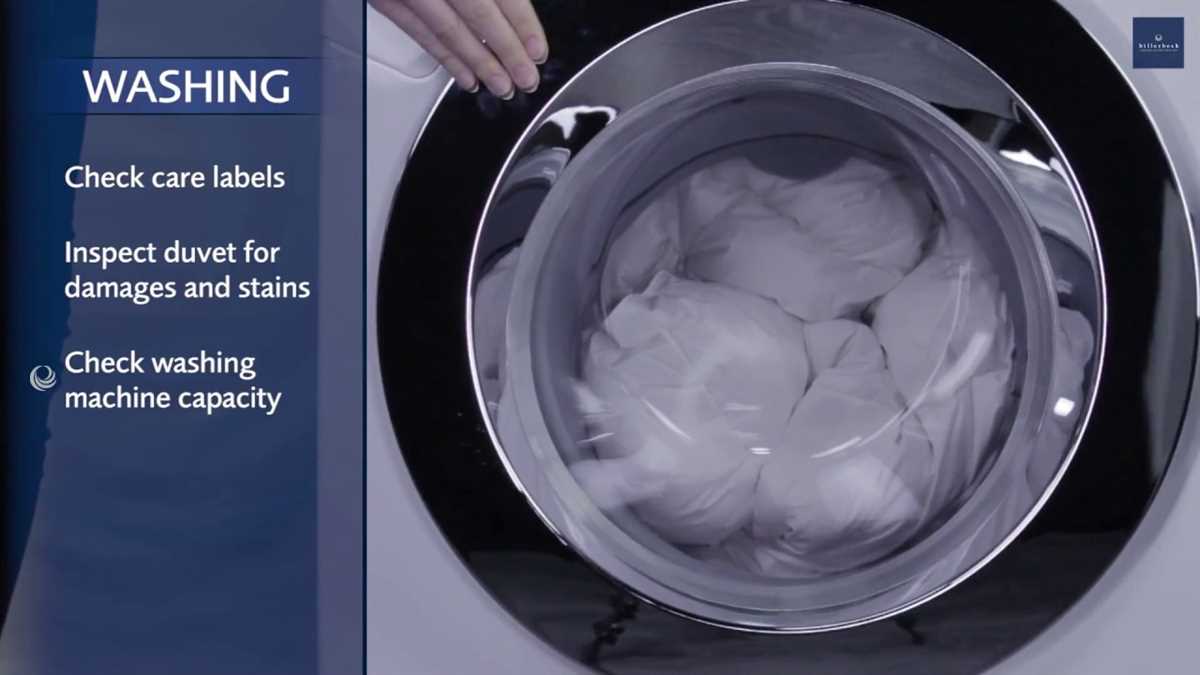
Dust mites and allergens can thrive in bedding materials, causing allergies and respiratory issues. Washing your duvet regularly can help eliminate these allergens, providing a healthier sleeping environment.
3. Durability:
Properly caring for your duvet can help extend its lifespan. Regular maintenance, such as washing and airing, prevents the build-up of dirt and debris that can weaken the fabric and filling over time. This ensures that your duvet remains in good condition for longer.
4. Freshness:

A clean duvet provides a fresh and pleasant sleeping experience. Washing your duvet regularly helps remove odors and keeps it smelling clean and fresh.
5. Comfort:
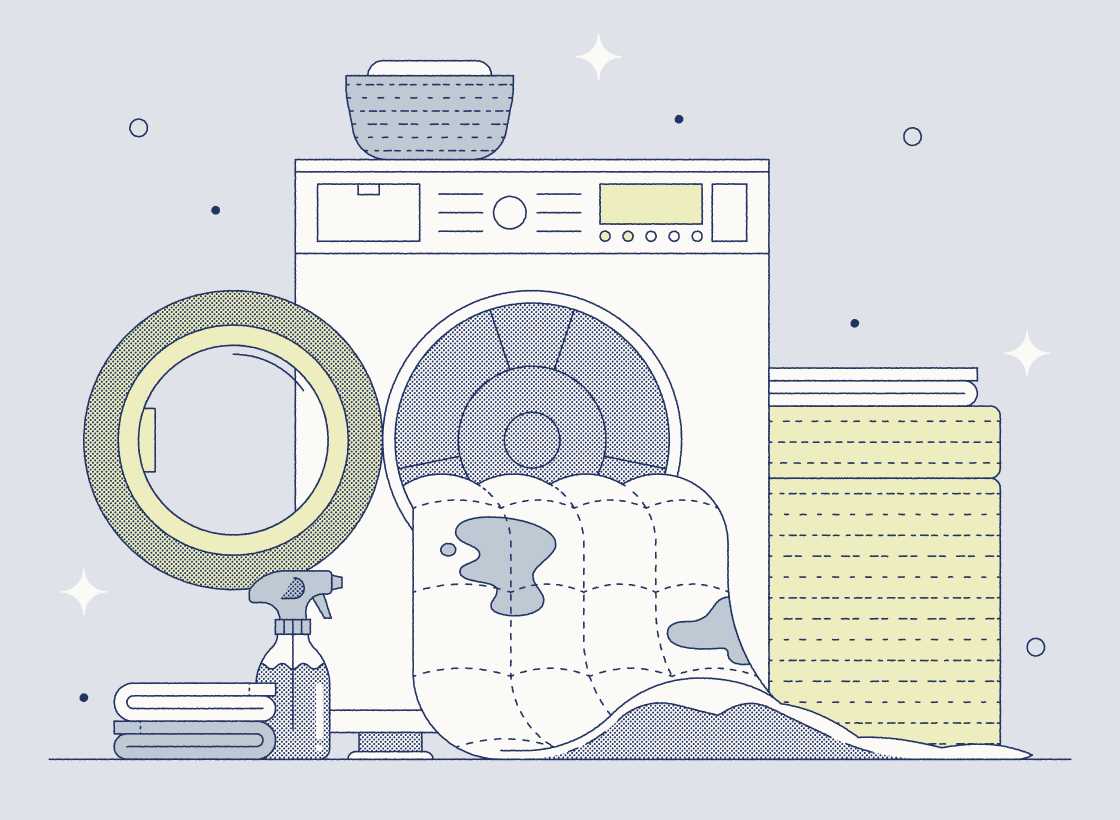
A well-maintained duvet offers optimal comfort and warmth. By taking care of your duvet, you can preserve its loft and fluffiness, ensuring that it continues to provide a cozy and comfortable sleeping environment.
Remember to always check the care label on your duvet for specific washing instructions and recommendations. Following these guidelines will help maintain the integrity of your duvet and ensure that it remains in optimal condition for years to come.
Why You Should Pay Attention to Cleaning
Keeping your duvet clean is essential for several reasons. Here are a few reasons why you should pay attention to cleaning:
- Hygiene: Duvets can harbor dust mites, allergens, and bacteria if not cleaned regularly. These can cause allergies and respiratory problems, especially for those with asthma or allergies. Washing your duvet helps remove these unwanted particles and ensures a cleaner sleeping environment.
- Durability: Regular cleaning helps prolong the life of your duvet. Dirt and stains can weaken the fabric over time, leading to tears and fraying. By cleaning your duvet regularly, you can prevent these issues and ensure it remains in good condition.
- Odor: Sleeping with a dirty or unwashed duvet can lead to unpleasant odors. Sweat and body oils can build up over time and create a musty smell. Washing your duvet eliminates these odors and leaves it smelling fresh.
- Appearance: A clean duvet not only feels better to sleep under but also looks better. Stains and discoloration can make your duvet appear old and worn out. Regular cleaning helps maintain its appearance and keeps it looking newer for longer.
- Allergies: If you suffer from allergies or sensitivities, a clean duvet is even more important. Regular cleaning helps remove allergens such as dust mites, pollen, and pet dander, providing relief for those with allergies or asthma.
It is recommended to follow the care instructions provided by the manufacturer for cleaning your duvet. In some cases, it may be necessary to take your duvet to a professional cleaner or use a large commercial washing machine. By paying attention to cleaning, you can ensure a healthier and more comfortable sleep environment.
Can You Safely Wash Duvets in a Washing Machine?
Washing your duvet regularly is important for maintaining its cleanliness and extending its lifespan. While it is generally safe to wash duvets in a washing machine, there are some factors to consider to ensure a successful wash:
Check the Care Label
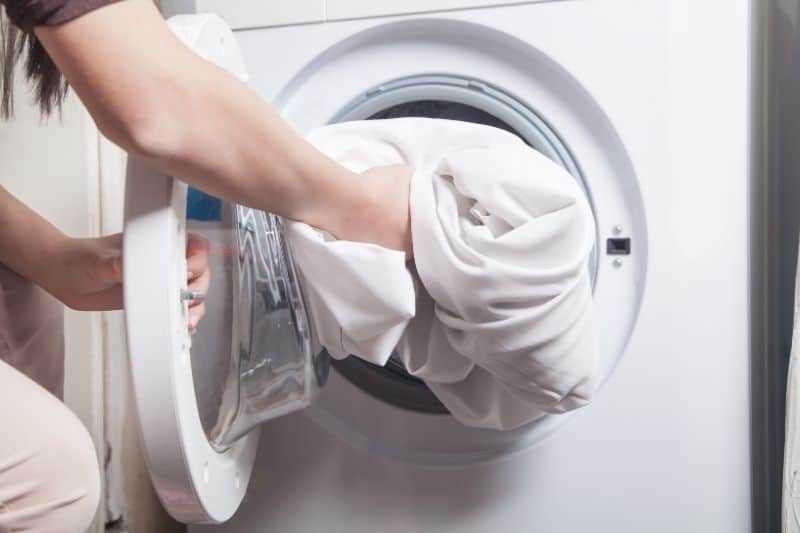
Before washing your duvet, always check the care label first. The care label provides instructions specific to your duvet’s material and construction. It will indicate whether the duvet can be machine washed or if it requires dry cleaning.
Choose the Right Washing Machine
Duvets come in different sizes, and it’s essential to choose a washing machine that can accommodate the size of your duvet. A front-loading washing machine is often preferred, as it allows for more space and gentle handling of the duvet.
Use the Right Detergent

When washing your duvet, use a mild detergent that is suitable for the duvet’s fabric and is free from harsh chemicals. Avoid using bleach or fabric softeners, as they can damage the duvet’s filling and fabric.
Pre-Treat Stains
If your duvet has any stains, pre-treat them before washing. Follow the instructions on the stain remover product and test it on a small, inconspicuous area of the duvet first to check for any adverse reactions.
Load the Washing Machine Properly
Place the duvet in the washing machine loosely to allow for even distribution of water and detergent. Avoid overloading the machine, as this can cause inadequate cleaning and potential damage to the duvet.
Choose the Right Cycle and Temperature
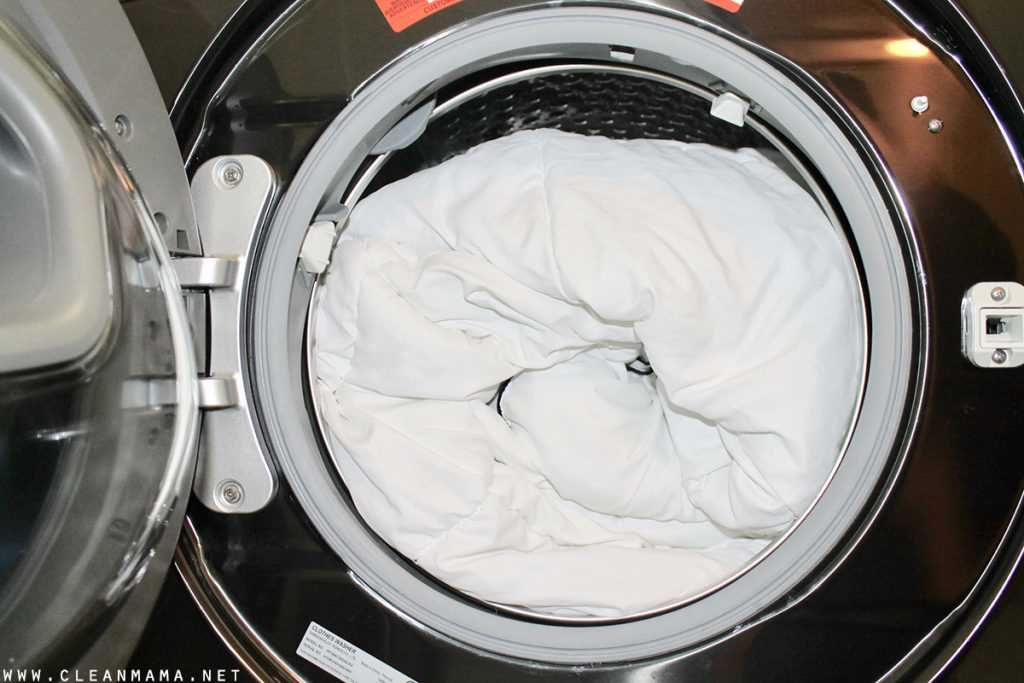
Select a gentle cycle with a low to medium temperature setting to avoid damaging the duvet’s filling and fabric. Avoid using high heat, as it can cause shrinkage and affect the loftiness of the duvet.
Drying the Duvet
After washing, it’s important to dry the duvet thoroughly to prevent the growth of mold and mildew. Follow the care label instructions for drying, or consider using a large capacity dryer with low heat. Alternatively, you can air dry the duvet outdoors, ensuring it is completely dry before storing it.
Monitor the Washing Process
While the washing machine is running, periodically check on the duvet to ensure it is washing properly and there are no leaks or other issues. If necessary, adjust the settings or stop the cycle to address any problems.
Following these guidelines can help you safely wash your duvet in a washing machine, keeping it clean, fresh, and in excellent condition for years to come.
Finding the Right Washing Machine
When it comes to washing duvets, it is important to have the right washing machine. Here are some factors to consider when searching for the perfect washing machine:
1. Capacity
Make sure to choose a washing machine with a large enough capacity to accommodate your duvet. Duvets can be bulky, so a machine with a large drum size will ensure that it is evenly washed and rinsed.
2. Special Wash Cycles
Look for a washing machine that offers special wash cycles specifically for duvets or bedding. These cycles are designed to handle the delicate nature of duvets and provide a thorough clean while preserving the fabric.
3. Adjustable Spin Speed
Having the ability to adjust the spin speed is essential when washing duvets. High spin speeds can cause damage to the filling or fabric, so being able to lower the spin speed will help protect your duvet during the washing process.
4. Temperature Control
Ensure that the washing machine has temperature control options. Duvets may require different water temperatures depending on their materials and whether they are filled with down or synthetic fibers. Being able to adjust the temperature will help maintain the integrity of the duvet.
5. Gentle Washing Action
Look for a washing machine that provides a gentle washing action. Aggressive washing can cause damage or wear to the duvet, so a machine with a gentle or delicate wash setting will help ensure that your duvet is cleaned without being subjected to unnecessary stress.
6. Size and Space
Consider the size and space available in your laundry area when choosing a washing machine. Measure the space to ensure that the machine you select will fit comfortably. Additionally, check the door opening size to make sure you can easily load and unload your duvet into the machine.
7. Reviews and Recommendations
Before making a final decision, read reviews and seek recommendations from others who have washed duvets in their washing machines. This will provide insights into the performance and reliability of different models and brands.
By considering these factors, you can find the right washing machine that will effectively clean your duvet while preserving its quality and lifespan.
Understanding the Duvet’s Fabric Composition
When it comes to washing a duvet in the washing machine, it’s important to understand the fabric composition of the duvet. Different fabrics require different care and may have specific washing instructions.
Cotton:
- Cotton duvet covers are one of the most common types of duvet fabrics.
- They are generally safe to wash in the machine, but it’s important to check the care label for any specific instructions.
- Most cotton duvets can be washed on a gentle cycle with a mild detergent.
- It’s recommended to wash cotton duvets separately to prevent any color bleeding or damage.
Polyester:
- Polyester duvets are known for their durability and wrinkle resistance.
- They are machine washable, but it’s important to follow the care instructions on the label.
- Most polyester duvets can be washed on a gentle or delicate cycle with a mild detergent.
- It’s advisable to wash polyester duvets separately or with similar colors to avoid any color transfer.
Microfiber:
- Microfiber duvets are made from very fine synthetic fibers, which give them their soft and lightweight feel.
- They are usually safe to machine wash, but it’s always best to check the care label.
- Most microfiber duvets can be washed on a gentle or delicate cycle with a mild detergent.
- It’s recommended to wash microfiber duvets separately to prevent any lint transfer.
Down:
- Down duvets are often filled with feathers for warmth and insulation.
- They require special care and may not be suitable for machine washing.
- It’s recommended to follow the care label instructions and, if machine washing is allowed, use a gentle or delicate cycle with a down-specific detergent.
- Down duvets may need to be dried in a large commercial dryer or professionally cleaned to ensure proper care.
It’s important to note that these are general guidelines and it’s always best to follow the specific care instructions provided by the duvet manufacturer. If in doubt, consider consulting a professional cleaner or dry cleaner for advice on the best way to clean your duvet.
Expert Tips for Washing Duvets
Washing duvets can be a daunting task, but with the right knowledge and techniques, it can be done effectively. Here are some expert tips to help you wash your duvet:
1. Check the care label
Before washing your duvet, always check the care label for specific instructions. Some duvets may require professional cleaning or have special care requirements, so it’s important to follow the manufacturer’s recommendations.
2. Use a large capacity washing machine
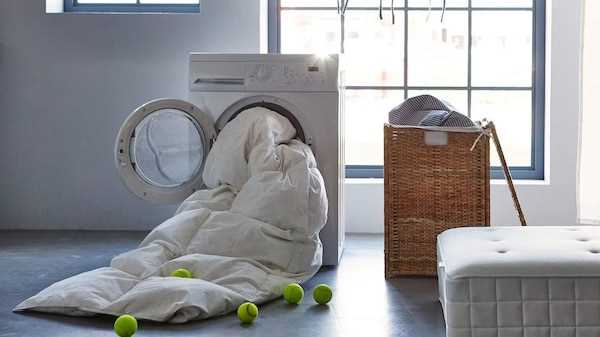
Ensure that the washing machine you use has a large enough capacity to accommodate the duvet. A machine with a capacity of at least 7kg is usually suitable for washing most duvets.
3. Pre-treat stains

If your duvet has any stains, it’s best to pre-treat them before washing. Use a stain remover or gently rub some mild detergent onto the stained area. Let it sit for a few minutes before washing.
4. Use a gentle detergent
When washing your duvet, use a gentle detergent that is suitable for delicate fabrics. Avoid using bleach or harsh chemicals as they can damage the duvet’s filling and fabric.
5. Select a delicate or gentle cycle
Choose a delicate or gentle cycle on your washing machine to wash the duvet. This will help prevent excessive agitation and minimize the risk of damaging the duvet.
6. Avoid overcrowding
Avoid overcrowding the washing machine with too many items, as this can prevent the duvet from getting clean thoroughly. It’s best to wash the duvet on its own or with a few other lightweight items.
7. Rinse thoroughly
After the washing cycle is complete, ensure that the duvet is rinsed thoroughly. Any detergent residue left in the duvet can cause skin irritation or affect its fluffiness.
8. Dry properly
When drying your duvet, it’s important to follow the care label instructions. Some duvets can be tumble dried on a low heat setting, while others may need to be air-dried. Ensure that the duvet is completely dry before storing or using it again to prevent mold or mildew growth.
9. Fluff and reshape
Once the duvet is dry, give it a good shake or fluff to redistribute the filling evenly. Reshape the duvet if necessary to restore its original shape and loft.
By following these expert tips, you can ensure that your duvet is washed effectively and maintains its quality for years to come.
Choosing the Right Detergent
When washing a duvet in the washing machine, it is important to choose the right detergent. The right detergent can help remove dirt, stains, and odors while keeping the duvet clean and fresh. Here are some factors to consider when choosing a detergent for washing your duvet:
Type of Detergent
- Regular Detergent: Regular detergents are suitable for most duvets made from synthetic materials. They are designed to remove dirt and stains effectively.
- Gentle or Delicate Detergent: If your duvet is made from delicate fabrics such as silk or wool, it is recommended to use a gentle or delicate detergent. These detergents are formulated to clean sensitive materials without causing damage.
- Natural or Eco-friendly Detergent: If you prefer using environmentally friendly products, opt for a natural or eco-friendly detergent. These detergents are free from harsh chemicals and are made from plant-based ingredients.
Scented or Unscented Detergent
Consider whether you prefer a scented or unscented detergent. Some people enjoy the fresh scent that a scented detergent provides. However, if you have sensitivities or allergies to fragrances, it is best to choose an unscented detergent.
Allergen Reducing Detergent
If you or someone in your household has allergies or asthma, you may want to consider using an allergen-reducing detergent. These detergents are specifically formulated to remove allergens such as dust mites, pet dander, and pollen from fabrics.
Choosing the Right Amount
Follow the manufacturer’s instructions on the detergent label to determine the right amount to use. Using too much detergent can leave a residue on your duvet, while using too little may not effectively clean it.
Pre-treating Stains
If your duvet has stubborn stains, it may be beneficial to pre-treat them before washing. Use a stain remover or detergent directly on the stains and let it sit for a few minutes before washing.
Remember to check the care label on your duvet before washing and follow any specific instructions or recommendations provided by the manufacturer. By choosing the right detergent, you can ensure that your duvet is thoroughly cleaned and maintained for prolonged use.
FAQ
Can I wash my duvet in the washing machine?
Yes, you can wash your duvet in the washing machine as long as it fits comfortably and the fabric allows for machine washing.
What should I do before washing my duvet in the machine?
Before washing your duvet in the machine, you should check the care instructions on the label to make sure it’s suitable for machine washing. You should also remove any duvet covers or pillowcases and empty any pockets.
Can I use regular laundry detergent to wash my duvet?
Yes, you can use regular laundry detergent to wash your duvet. However, it’s recommended to use a mild detergent and avoid using fabric softener as it can leave a residue on the duvet.
What cycle should I use when washing my duvet?
When washing your duvet, you should use a gentle or delicate cycle to prevent any damage to the fabric. It’s also advisable to wash it on a cool temperature setting.
How should I dry my duvet after washing it?
After washing your duvet, you should check the care instructions on the label to see if it can be tumble dried. If it’s safe to tumble dry, you can use a low heat setting. Alternatively, you can air dry it by hanging it outside or laying it flat on a clean surface.
Can I wash my duvet in the washing machine?
Yes, you can wash your duvet in the washing machine. However, it is important to check the care label on your duvet to ensure it is suitable for machine washing.
What should I do if my duvet is too large for the washing machine?
If your duvet is too large for the washing machine, you have a few options. One option is to take it to a laundromat with larger capacity machines. Another option is to hand wash the duvet in a bathtub or large basin using a gentle detergent and then air dry it. If neither of these options are feasible, you may need to consider professional dry cleaning.











